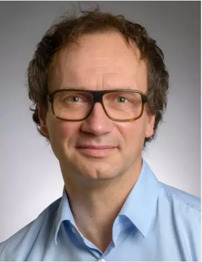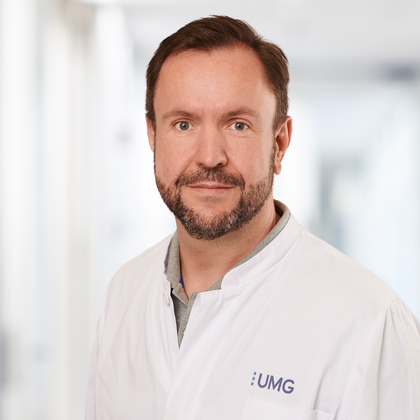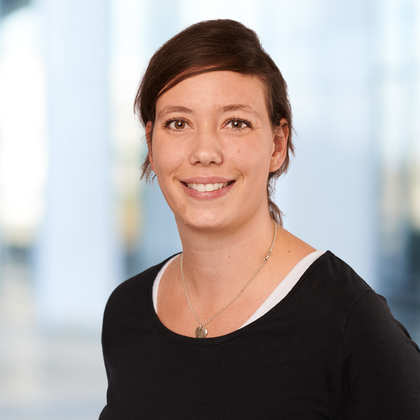RG Urlaub: Bioanalytics
Our group focuses on the development and application of mass spectrometry-based methods for proteome analysis. Located in the Department of Clinical Chemistry and led by Prof. Dr. Henning Urlaub, it encompasses the UMG’s Core Facility Proteomics led by Christof Lenz, and is associated to Henning Urlaub’s research group ‘Bioanalytical Mass Spectrometry’ at the Max Planck Institute for Multidisciplinary Sciences, Göttingen via a bridge professorship. Methods are frequently developed as research collaborations, and are then transferred to the Core Facility Proteomics to be made available to researchers across the UMG and the Göttingen Research Campus.
Members of the group are currently associated to the following DFG-funded Collaborative Research Centers (CRCs) or Priority Programmes:
- SFB1002 A09 – Local molecular nanodomain regulation of cardiac ryanodine receptor function
- SFB1190 Z02 - Mass spectrometry based proteomics
- SFB1286 A08 – The role of post-translationally modified proteins in synaptic transmission
- SFB1286 A06/A10 - Mitochondria function and turnover in synapses
- SFB1565 P04 – Dissecting protein-RNA and –DNA interactions in cells through crosslinking/mass spectrometry analyses
- SFB1565 Z02 – Mass spectrometry service
- SPP2141 - Mass spectrometric proteomic and structural proteomics on CRISPR-Cas of archaea and bacteria
Research Topics
Structural Proteomics by Protein-Protein Crosslinking Mass Spectrometry (XL-MS) (Prof. Dr. Henning Urlaub)
Biological function frequently depends on proteins interacting with other proteins, with RNA/DNA or with small organic ligands. XL-MS has recently been established as a major tool to elucidate not only interactions between, but the actual contact sites of proximal proteins within biomolecular complexes. Bifunctional crosslinking reagents are used to establish covalent links between reactive groups of proteins in close proximity. Following enzymatic digestion to peptide-peptide cross-links, these can be identified using high resolution LC/MS/MS analysis and dedicated database searching algorithms. The resulting information about spatially proximal amino acid residues can then be used to derive information about the composition, stoichiometry or – in combination with other methods such as NMR or cryoEM – even structure of biomolecular complexes.
Our group applies a range of crosslinking reagents, methods and computational approaches to the elucidation of protein-protein interactions in complex biological systems such as large functional complexes (e.g., the spliceosome, RNA polymerase), cellular compartments or even whole cells.
Data Independent Acquisition Mass Spectrometry (DIA-MS) in Clinical Proteomics (Dr. Christof Lenz)
DIA-MS in proteome analysis is a data acquisition paradigm where quantitative information on peptides and proteins is not dependent on successful sequencing events, but is permanently recorded for the whole protein and peptide complement of each biomedical sample. Information on sequence is inferred from pre-recorded MS/MS spectral libraries to control false detection rates (FDRs). As DIA-MS can produce extremely consistent quantitative data on large numbers of biological samples, it is particularly suited for clinical proteomics using large sample cohorts. We have successfully established DIA-MS as a tool for proteome studies not only in cell culture, but specifically also in mammalian tissues and body fluids.
Global proteome profiling by DIA-MS in e.g. brain or cardiac tissues enables detailed insights into the molecular basis of many disease processes both in model systems and in patient samples, and provides a powerful tool for the discovery of diagnostic and therapeutic protein biomarkers. Key collaborations include Prof. Dr. Philipp Ströbel and Dr. Hanibal Bohnenberger, Department of Pathology, UMG; and Prof. Dr. Thomas Oellerich at the Department of Hematology and Oncology, University Medical Center Frankfurt/Main.
Mass Spectrometry-Based Cardiovascular Proteomics (Dr. Christof Lenz)
Proteomics mass spectrometry (MS) has established itself as a key technology in fundamental biomedical research. It helps shed light not only on protein composition and abundance in tissues and body fluids, but also on dynamic changes in posttranslational modification (PTM) states or protein/protein complexes. Compared to e.g. oncology, however, it has found surprisingly limited application to cardiovascular research to date.
We have established applied a range of MS-based workflows specifically to promote cardiovascular research including:
- Regionally resolved global proteome profiling in cardiac and vascular tissue biopsies from both animal models and patient samples using DIA-MS;
- Global phosphoproteome profiling in both cellular models and animal tissues;
- Global complexome profiling mass spectrometry (CP-MS) in animal tissues and patients;
- Affinity purification mass spectrometry (AP-MS) and proximity labeling mass spectrometry (PL-MS) to study the interactomes and proxiomes of selected protein targets.
Together with our partners at the UMG, we are successfully applying these approaches to promote the fundamental understanding of a range of cardiovascular diseases such as atrial fibrillation, aortic valve stenosis or aortic isthmus stenosis. Key collaborations include Prof. Dr. Stephan Lehnart and Dr. Sören Brandenburg, Department of Cardiology and Pneumology, UMG; Prof. Dr. Niels Voigt, Department of Pharmacology, UMG; and Lukas Cyganek, Stem Cell Unit, UMG.
Kontakt

Kontaktinformationen
- Telefon: +49 551 3965192
- E-Mail-Adresse: hurlaub(at)gwdg.de

Kontaktinformationen
- Telefon: +49 551 3965192
- E-Mail-Adresse: christof.lenz(at)med.uni-goettingen.de

Kontaktinformationen
- Telefon: +49 551 3912501
- E-Mail-Adresse: lisa.neuenroth(at)med.uni-goettingen.de